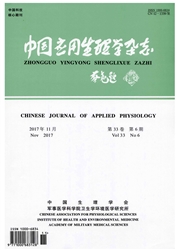

 中文摘要:
中文摘要:
目的:探讨慢性应激对不同性别小鼠空间认知能力的影响。方法:成年健康昆明小鼠32只,平均分为4组(n=8):雄性对照组和雄性应激组,雌性对照组和雌性应激组。研究采用改良的Kaz法,建立慢性应激小鼠模型,利用Morris水迷宫进行定位航行和空间搜索实验,观察不同性别的小鼠空间认知能力的改变。结果:经2周的应激处理后,在定位航行实验中,雄性应激组小鼠找到平台的潜伏期较之雄性对照组明显延长,而雌性应激组小鼠找到平台的潜伏期则明显低于其同性别对照组,且雄性应激组小鼠在平均游泳速度显著快于雌性应激组小鼠的情况下,其找到平台的潜伏期明显长于后者。空间搜索实验中,雄性应激组小鼠在原平台所在象限的停留时间显著低于雄性对照组(P〈0.05),而雌性应激组在原平台所在象限的停留时间显著高于雌性对照组(P〈0.05),且雌性应激组小鼠在原平台所在象限停留的时间明显长于雄性应激组小鼠。结论:慢性应激处理损伤了雄性小鼠的空间认知能力。而增强了雌性小鼠的空间认知能力。
 英文摘要:
英文摘要:
Objective: To investigate the effects of chronic stress on spatial cognitive ability in different sex mice. Methods: Thirty-two adult KM mice were divided into four groups ( n = 8) : male control and chronic stress group, female control and chronic stress group. We used the modified Kaz's methods to build on the chronic stress model of mice, and then used the place navigational testing and the probe trial testing by the Morris water maze to measure the spatial cognitive ability of mice. Results: Following two weeks stress treatment, in the place navigational testing, to male group, the average latency to find the platform in water maze of chronic stress group was longer than that of the control; to female group, the average latency of chronic stress group was shorter than the control. Moreover, the male stress group showed faster swim- ming speed but longer latency to find the platform. In the probe trial testing the female chronic stress group spent more time in the target quadrant compared to the male chronic stress group. Conclusion: Two weeks' chronic stress could impair male mice's spatial cognitive ability, but improve the female's.
 同期刊论文项目
同期刊论文项目
 同项目期刊论文
同项目期刊论文
 期刊信息
期刊信息
